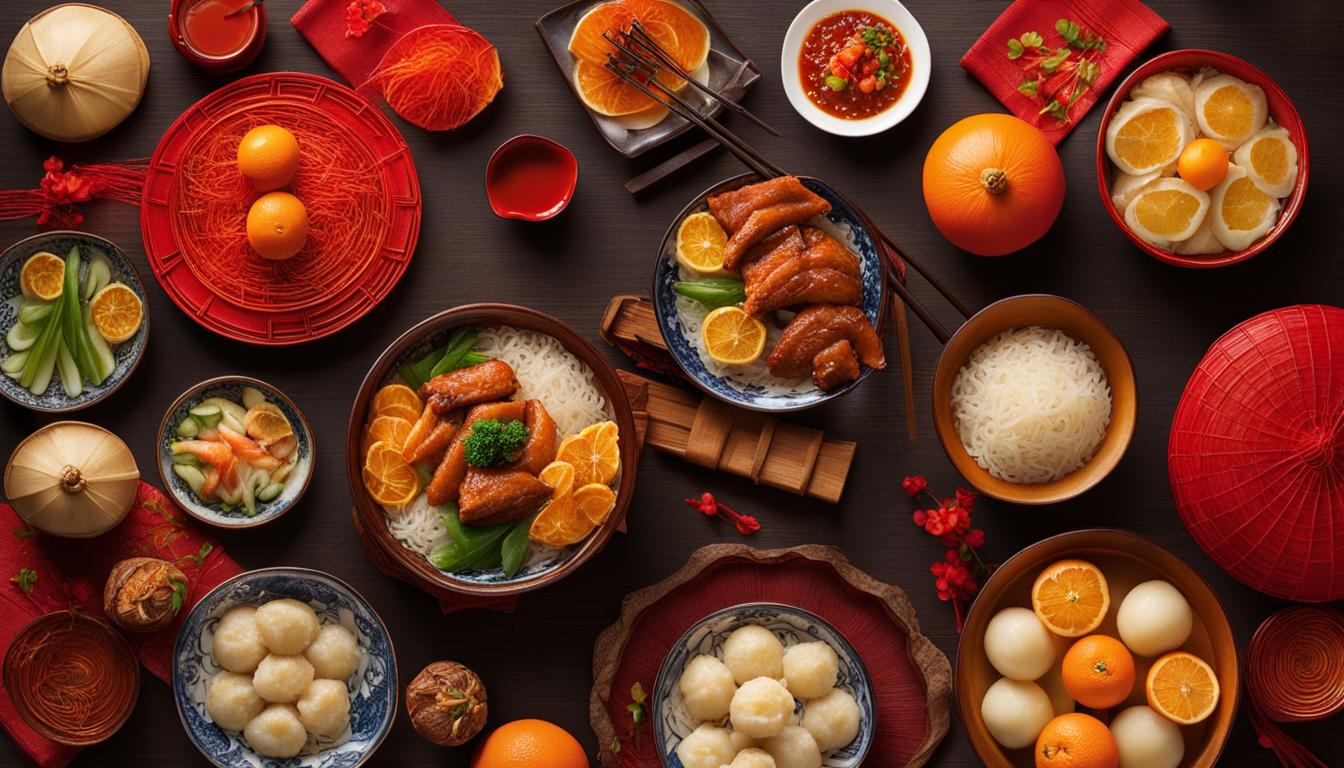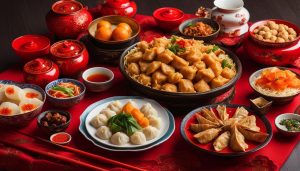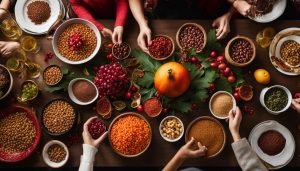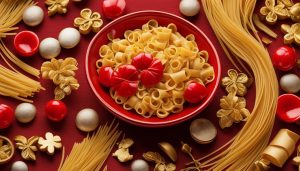Chinese New Year is a time for celebration and good fortune. One of the most important aspects of this festive season is the food that is eaten. Certain dishes have symbolic meanings and are believed to bring luck and prosperity for the coming year. These auspicious foods include fish, dumplings, whole chicken, Chinese New Year cake, spring rolls, sweet rice balls, and longevity noodles.
Contents
- 1 Fish – an Increase in Prosperity
- 2 Dumplings – Wealth and Fortune
- 3 Whole Chicken – Unity and Good Fortune
- 4 Chinese New Year Cake – Higher Income and Position
- 5 Conclusion
- 6 FAQ
- 6.1 What foods are traditionally eaten for good luck on Chinese New Year?
- 6.2 Why is fish considered a lucky food for Chinese New Year?
- 6.3 What is the significance of dumplings during Chinese New Year?
- 6.4 Why is a whole chicken served during Chinese New Year?
- 6.5 What is the meaning behind Chinese New Year cake?
- 6.6 What do spring rolls symbolize during Chinese New Year?
- 6.7 How do these traditional dishes bring good luck and prosperity?
- 7 Source Links
Key Takeaways:
- In Chinese culture, certain foods are believed to bring good luck and prosperity during the New Year.
- Auspicious foods for Chinese New Year include fish, dumplings, whole chicken, Chinese New Year cake, spring rolls, sweet rice balls, and longevity noodles.
- Fish represents an increase in prosperity, while dumplings symbolize wealth and fortune.
- Whole chicken signifies unity and good fortune, and Chinese New Year cake is associated with higher income and position.
- Spring rolls are believed to bring wealth and prosperity, and longevity noodles symbolize a long and prosperous life.
Fish – an Increase in Prosperity
Symbolic foods play a significant role in Chinese New Year celebrations, and one such food is fish. In Chinese culture, fish is considered a lucky food that brings an increase in prosperity. The word for fish in Chinese sounds like the word for ‘surplus,’ symbolizing the desire for abundance and good fortune in the coming year. To ensure a surplus, it is customary to have some fish left over from the New Year dinner.
A popular way to prepare fish for Chinese New Year is by steaming it. Steamed fish is believed to preserve the fish’s natural flavors and symbolism. The choice of fish for the New Year dinner is based on its auspicious homophonics. For example, the Chinese word for carp is similar to the word for ‘abundance.’ Therefore, serving carp during the New Year signifies the wish for an abundant year ahead.
Including fish in the Chinese New Year feast not only adds a delicious dish to the table but also carries deep symbolic meaning. It is believed that by consuming fish during this festive time, you invite prosperity and good luck into your life for the coming year.
Symbolic Foods for Chinese New Year
To further understand the significance of fish and other lucky foods for Chinese New Year, let’s explore the symbolism behind each dish:
| Lucky Food | Symbolism |
|---|---|
| Fish | Increase in prosperity |
| Dumplings | Wealth and fortune |
| Whole Chicken | Unity and good fortune |
| Chinese New Year Cake | Higher income and position |
| Spring Rolls | Wealth and prosperity |
These symbolic foods are carefully chosen to align with the wishes and aspirations of a prosperous year ahead. Including them in your Chinese New Year dinner not only adds flavor to the festivities but also carries the hopes and blessings of good luck and success.
Dumplings – Wealth and Fortune
Dumplings are a classic lucky food for Chinese New Year. They symbolize wealth and fortune, making them a must-have dish on the Chinese New Year dinner table. The tradition of eating dumplings during this festive season dates back centuries and holds deep cultural significance.
These bite-sized delicacies are made by hand, with the dough carefully rolled out and filled with a savory mixture of ingredients. The most common fillings for Chinese New Year dumplings include pork, shrimp, and vegetables. The shape of the dumplings is reminiscent of ancient Chinese currency – ingots or gold and silver nuggets – symbolizing prosperity and good fortune.
Traditionally, families gather around the kitchen table to make dumplings together, creating a joyful and bonding experience. The act of making and eating dumplings during Chinese New Year is believed to bring unity, good luck, and an abundant year ahead.
Whole Chicken – Unity and Good Fortune
When it comes to Chinese New Year food traditions, serving a whole chicken holds great significance. The inclusion of the head and feet in the dish represents unity and wholeness for the family. In Chinese culture, the word for chicken is a homophone for good luck and prosperity, making it a must-have dish during this festive time.
Preparing a whole chicken for Chinese New Year involves braising or roasting it to perfection. The dish is then offered to ancestors and gods as a gesture of gratitude for blessings and protection. This auspicious food not only symbolizes unity but also brings good fortune to households that partake in it.
With its deep symbolic meaning and delicious flavor, the whole chicken is a staple on the Chinese New Year dinner table. It serves as a reminder to appreciate the unity within the family and to embrace the blessings and good luck that the new year brings.

Table: Nutritional Information of Whole Chicken
| Nutrient | Amount per 100g |
|---|---|
| Protein | 20.6g |
| Fat | 11.2g |
| Carbohydrates | 0g |
| Cholesterol | 79mg |
| Iron | 0.9mg |
| Calcium | 8mg |
Source: USDA National Nutrient Database
Chinese New Year Cake – Higher Income and Position
Chinese New Year cake, also known as niangao, is a lucky food eaten on Chinese New Year’s Eve. Its name sounds like “getting higher year-on- by year” in Chinese, symbolizing the desire for a higher income or position. This sticky rice cake is made with ingredients like sticky rice, sugar, chestnuts, and Chinese dates.
In Chinese culture, niangao holds great significance as it represents continuous growth and improvement in various aspects of life. The sticky texture of the cake symbolizes the bonding and unity of the family, while the sweetness signifies a year filled with joy and happiness.
To prepare niangao, sticky rice is soaked overnight, then ground into a thick batter with sugar and other ingredients. The mixture is steamed until it becomes soft and chewy, creating a delightful texture. Some variants of the cake include additional ingredients such as red bean paste or osmanthus flowers for added flavor.
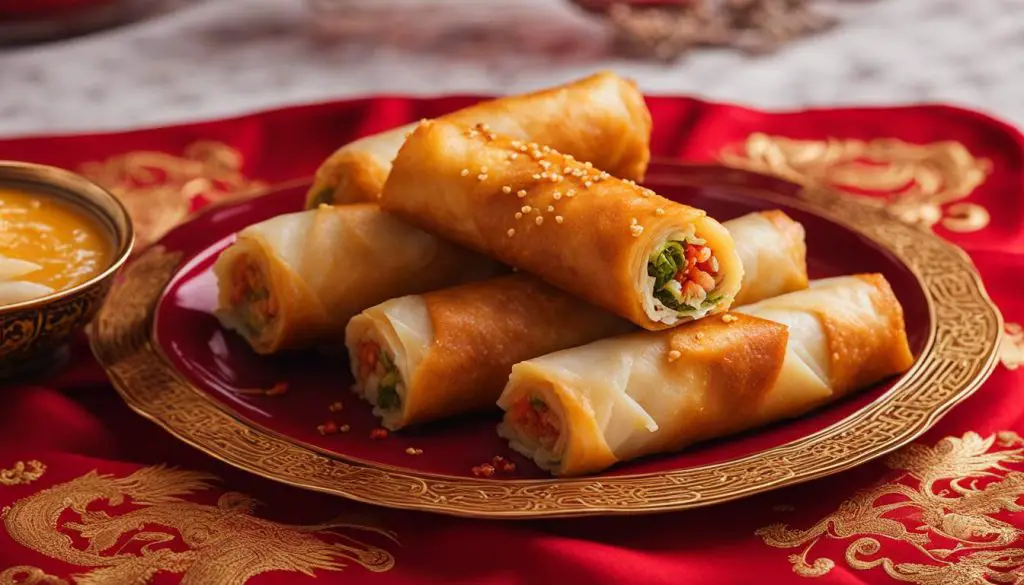
Spring Roll Recipe
- Prepare the filling by combining minced pork, shredded vegetables, bean sprouts, and seasonings.
- Wrap the filling in spring roll wrappers, ensuring they are tightly sealed.
- Heat oil in a deep-fryer or pan and fry the spring rolls until crispy and golden brown.
- Serve the spring rolls hot with your favorite dipping sauce, such as sweet chili sauce or soy sauce.
Conclusion
Chinese New Year is a time to gather with loved ones and celebrate good luck and prosperity for the coming year. By including auspicious foods such as fish, dumplings, whole chicken, Chinese New Year cake, spring rolls, sweet rice balls, and longevity noodles in your festive meals, you can usher in positive energy and good fortune.
These traditional dishes have deep symbolic meanings and are an integral part of Chinese New Year traditions. Eating these lucky foods is believed to bring good luck and ensure a prosperous year ahead.
So, as you prepare for Chinese New Year, remember to include these lucky dishes on your menu. Enjoy the festivities with your family and friends, and may the year ahead be filled with abundance and good fortune!
FAQ
What foods are traditionally eaten for good luck on Chinese New Year?
Some of the lucky foods for Chinese New Year include fish, dumplings, whole chicken, Chinese New Year cake, spring rolls, sweet rice balls, and longevity noodles.
Why is fish considered a lucky food for Chinese New Year?
Fish is considered lucky because the word for fish sounds like ‘surplus’ in Chinese, symbolizing an increase in prosperity. Having some fish left over for the next year ensures a surplus.
What is the significance of dumplings during Chinese New Year?
Dumplings symbolize wealth and fortune. The filling for dumplings can vary, but popular options include pork, shrimp, and vegetables. They are usually handmade and can be boiled, steamed, or fried.
Why is a whole chicken served during Chinese New Year?
Serving a whole chicken, including the head and feet, represents unity and wholeness for the family. The word for chicken in Chinese is a homophone for good luck and prosperity.
What is the meaning behind Chinese New Year cake?
Chinese New Year cake, also known as niangao, symbolizes the desire for a higher income or position. It is made with sticky rice, sugar, chestnuts, and Chinese dates.
What do spring rolls symbolize during Chinese New Year?
Spring rolls are believed to bring wealth and prosperity. They are shaped like gold bars and can be filled with various ingredients such as pork, vegetables, and bean sprouts.
How do these traditional dishes bring good luck and prosperity?
These auspicious foods are believed to bring positive energy and good fortune during Chinese New Year celebrations, ensuring a prosperous year ahead and bringing blessings and protection from ancestors and gods.

